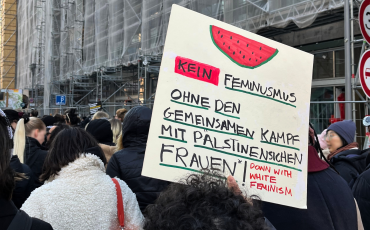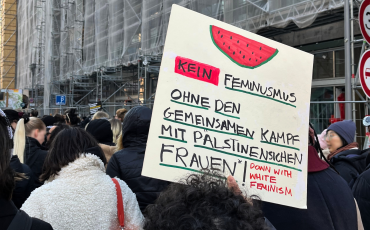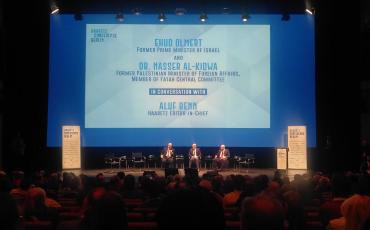With no negotiated settlement for the Israeli-Palestinian conflict in sight, international players must consider alternative strategies and instruments to ensure the fundamental rights of both Israelis and Palestinians and end Israel’s occupation of Palestinian territories. Europe can and should play a key role.
In April 2014 US-sponsored talks between Israeli and Palestinian negotiators broke down. The respective leaders did not meet in person nor were negotiators able to reach a consensus on any of the core issues of the conflict. Although the Trump Administration has announced that it would broker the „ultimate deal“, a peace agreement is not in sight. The content of this “ultimate deal” remains elusive. Furthermore, statements by the US President, his advisors and the US ambassador to Israel have been perceived as blatantly one-sided in favour of the State of Israel and have cast doubt on the Administration’s commitment to a two-state formula.
In Israel, Prime Minister Benyamin Netanyahu and his coalition partners have not sat idle. Rather, they have continued to entrench the occupation in the West Bank and East Jerusalem. In this vein, the government has prepared the ground for legalizing settlement outposts on private Palestinian land, given the green light for building the first entirely new settlement since 25 years and launched an unprecedented drive of house demolitions of Palestinians. By promoting the “Greater Jerusalem” bill, which would redraw the municipal boundaries of the city so as to incorporate some 130,000 settlers, the cabinet is now attempting de facto to annex parts of the West Bank and further isolate East Jerusalem from its hinterland.
For their part, Palestinians have lost all hope of reaching a negotiated agreement with the current Israeli government. The Palestinian leadership has thus taken unilateral measures aimed at internationalization of the conflict via the UN and its bodies as well as seeking international justice by making their case at the International Criminal Court (ICC). Under these circumstances the prospects of success for the classical formula – bilateral negotiations under American auspices – appear to be nonexistent. Therefore other international actors with different strategies and instruments should come to the fore. The EU and its member states could and should become more prominent players.
A European obligation to act
Although quick results are unlikely, Europeans do not have the luxury of waiting for better conditions to emerge. Rather, under the 1949 Geneva Convention on the Protection of Civilian Persons in Time of War, they are not only legally obligated to deny recognition to unlawful acts, they must also work for compliance with international law, including by obliging the occupying power meet its obligations.
Moreover, under the June 2000 EU-Israel Association Agreement, respect for human rights and democratic principles is considered an essential element of the relationship, and should guide all internal and international policy of the parties (Article 2).
Lastly, Germany should feel a particular commitment to rectifying a situation in which fundamental human rights are denied and conflict settlement is made ever more unlikely. After all, Germany considers Israel’s right to exist an important element of its raison d’étât and has prided itself in establishing close, trusting relations with Israel.
However, to date, Germany and its partners in the EU have had little impact on conflict dynamics and have failed to make progress towards their proclaimed aims of a two-state settlement with a democratic, sovereign and viable Palestinian state living peacefully next to Israel.
No impact?
There are several reasons for this failure: First, the EU, despite being the largest donor to the Palestinians and Israel’s biggest trade partner, has continued to accept US leadership on the issue of advancing peace. Second, the Europeans have sent confusing signals: On the one hand the EU has taken measures of differentiation in dealing with Israel and Israeli settlements in the occupied Palestinian territories. It has also regularly voiced strong criticism of Israeli occupation policies.
On the other hand many EU member states, including Germany, have moved towards ever closer bilateral relations with Israel. EU-Israel relations have also become closer, even though an official upgrade agreed upon in June 2008, that would have led to an intensification of ties in the political, economic, trade, academic, security and diplomatic fields, has remained on hold due to lack of progress in the peace process. As a consequence, the EU and its member states have not had any influence on either the public or decision-makers in Israel in a way that would have changed their cost-benefit-analysis so as to give a premium to ending the occupation, no longer deny economic, political and civil rights to Palestinians and seek peace. Often, that has led to the conclusion that Europeans cannot have any effective influence on the parties to the conflict and are forced to play a secondary role in an approach dominated by the USA, the only party considered capable of providing credible security guarantees.
This series of articles argues that this is not the case. Still, to become an important player the EU and its member states must carry out a serious and self-critical lessons learned exercise. In September 2017, the EU High Representative announced that the EU would review the modalities for its engagement on the ground to make sure that all financial support serves the political goal of a two-state settlement. Such a review should not stop at financial measures but should also take into account European politics that provide the context for the engagement on the ground. The exercise should be aimed at finding out which measures have so far seen success or failure, and why. Based on that, an analysis of how measures can be applied more effectively is crucial.
Article Series on European Approaches
In the weeks to follow, authors from Israel and Europe will look closely at different approaches and instruments beyond traditional diplomacy to reach the goals of ending occupation and Israeli-Palestinian peace, and analyse how these measures could be made more effective. In particular, they will shed light on differentiation policies, dialogue fora, incentives, and punitive measures. One article will tackle the question how Israeli public and decision-makers are likely to be affected by such measures based on recent polling.
At a later stage, a set of articles will explore measures aimed at influencing the Palestinian public and decision-makers. One overarching theme has already emerged from a debate among the authors: It has become clear that Europeans have missed out on a public diplomacy strategy that would have explained their measures, such as the correct labelling of settlement products or the 2013 offer of a “special privileged partnership” for Israel and the Palestinians after a peace agreement, to the Israeli public. Instead, they have allowed the Israeli government to frame the EU as a hostile actor and demonize European approach as part of an international delegitimization campaign against Israel.
Dr. Muriel Asseburg is a Senior Fellow in the Middle East and Africa Division of Stiftung Wissenschaft und Politik (SWP), the German Institute for International and Security Affairs in Berlin.
Christoph Dinkelaker is a co-founder of Alsharq and head of Alsharq’s Travel Department. He has worked several years in Jerusalem with the Willy Brandt Center, the Friedrich Ebert Foundation and as a freelance journalist.




















